Reflective Essay: Parenthood (1989) - Family Systems Themes Analysis
VerifiedAdded on 2022/09/18
|11
|3158
|30
Essay
AI Summary
This reflective essay analyzes the 1989 movie "Parenthood," exploring various family systems themes and parenting styles. The essay delves into the characters, particularly Gil Buckman, Frank Buckman, and Kevin, examining their relationships and the challenges they face. It discusses the different parenting approaches, from authoritative to authoritarian, and how they impact the family dynamics. The essay highlights key themes such as adversity, denial, and exhaustion, demonstrating how the film portrays the complexities of family life. Additionally, the essay connects the characters to psychological theories like Erikson's stages of development and Levinson's midlife crisis, providing a deeper understanding of their behaviors and motivations. The analysis also touches upon themes of crime and love, as they manifest within the family unit, offering a comprehensive examination of the movie's portrayal of family relationships and societal expectations. The essay is a thoughtful reflection on the film's depiction of family struggles and triumphs, using critical thinking and relevant readings to illustrate the importance of these family systems.
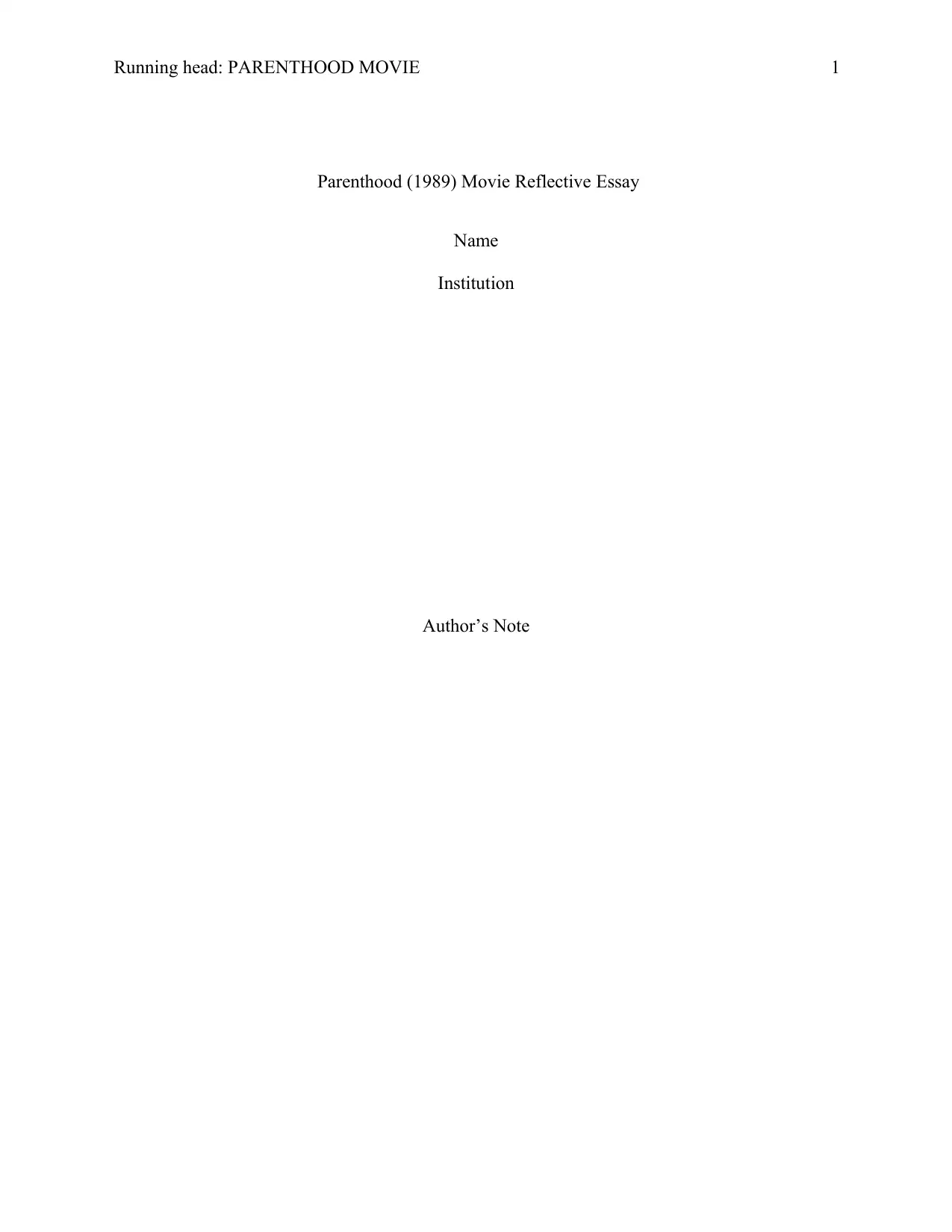
Running head: PARENTHOOD MOVIE 1
Parenthood (1989) Movie Reflective Essay
Name
Institution
Author’s Note
Parenthood (1989) Movie Reflective Essay
Name
Institution
Author’s Note
Paraphrase This Document
Need a fresh take? Get an instant paraphrase of this document with our AI Paraphraser
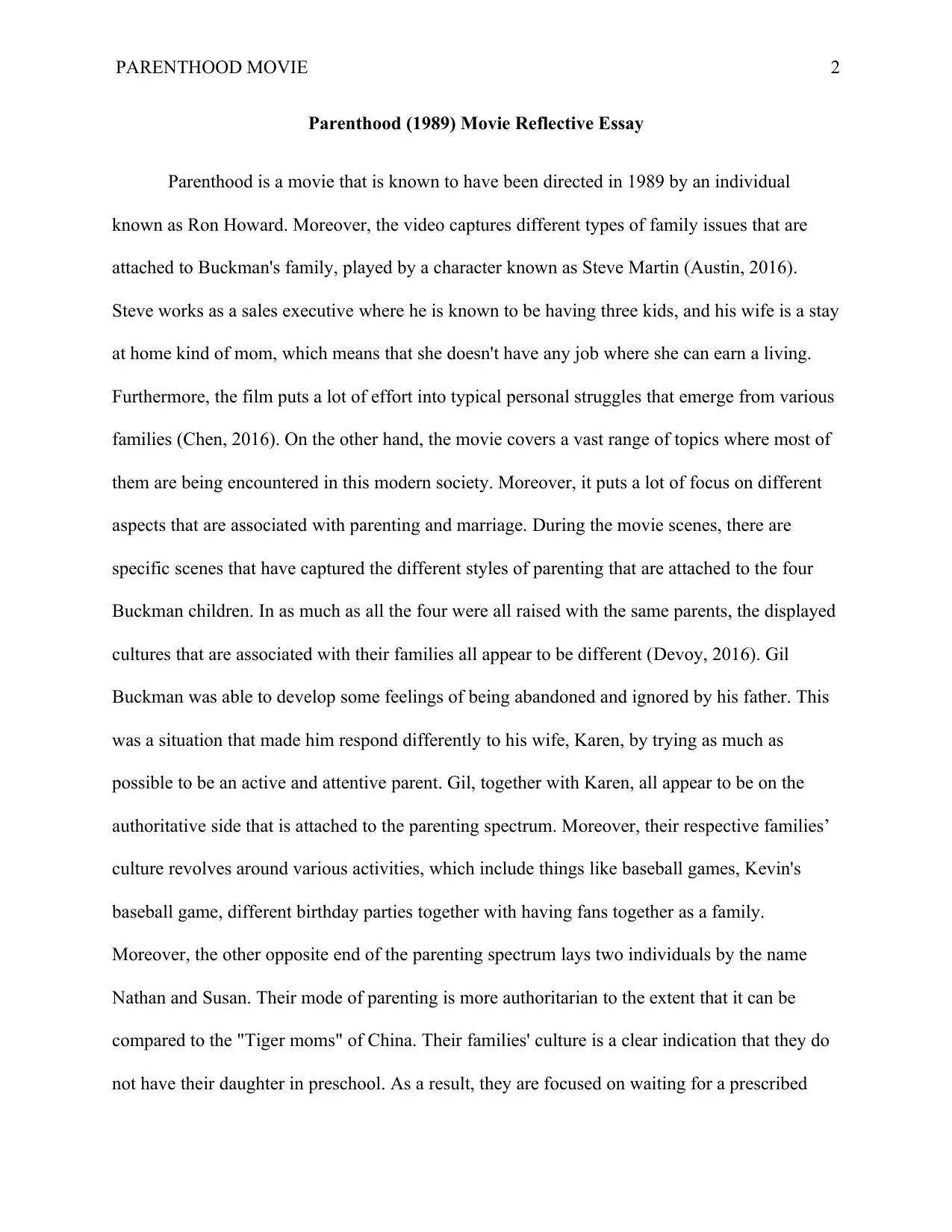
PARENTHOOD MOVIE 2
Parenthood (1989) Movie Reflective Essay
Parenthood is a movie that is known to have been directed in 1989 by an individual
known as Ron Howard. Moreover, the video captures different types of family issues that are
attached to Buckman's family, played by a character known as Steve Martin (Austin, 2016).
Steve works as a sales executive where he is known to be having three kids, and his wife is a stay
at home kind of mom, which means that she doesn't have any job where she can earn a living.
Furthermore, the film puts a lot of effort into typical personal struggles that emerge from various
families (Chen, 2016). On the other hand, the movie covers a vast range of topics where most of
them are being encountered in this modern society. Moreover, it puts a lot of focus on different
aspects that are associated with parenting and marriage. During the movie scenes, there are
specific scenes that have captured the different styles of parenting that are attached to the four
Buckman children. In as much as all the four were all raised with the same parents, the displayed
cultures that are associated with their families all appear to be different (Devoy, 2016). Gil
Buckman was able to develop some feelings of being abandoned and ignored by his father. This
was a situation that made him respond differently to his wife, Karen, by trying as much as
possible to be an active and attentive parent. Gil, together with Karen, all appear to be on the
authoritative side that is attached to the parenting spectrum. Moreover, their respective families’
culture revolves around various activities, which include things like baseball games, Kevin's
baseball game, different birthday parties together with having fans together as a family.
Moreover, the other opposite end of the parenting spectrum lays two individuals by the name
Nathan and Susan. Their mode of parenting is more authoritarian to the extent that it can be
compared to the "Tiger moms" of China. Their families' culture is a clear indication that they do
not have their daughter in preschool. As a result, they are focused on waiting for a prescribed
Parenthood (1989) Movie Reflective Essay
Parenthood is a movie that is known to have been directed in 1989 by an individual
known as Ron Howard. Moreover, the video captures different types of family issues that are
attached to Buckman's family, played by a character known as Steve Martin (Austin, 2016).
Steve works as a sales executive where he is known to be having three kids, and his wife is a stay
at home kind of mom, which means that she doesn't have any job where she can earn a living.
Furthermore, the film puts a lot of effort into typical personal struggles that emerge from various
families (Chen, 2016). On the other hand, the movie covers a vast range of topics where most of
them are being encountered in this modern society. Moreover, it puts a lot of focus on different
aspects that are associated with parenting and marriage. During the movie scenes, there are
specific scenes that have captured the different styles of parenting that are attached to the four
Buckman children. In as much as all the four were all raised with the same parents, the displayed
cultures that are associated with their families all appear to be different (Devoy, 2016). Gil
Buckman was able to develop some feelings of being abandoned and ignored by his father. This
was a situation that made him respond differently to his wife, Karen, by trying as much as
possible to be an active and attentive parent. Gil, together with Karen, all appear to be on the
authoritative side that is attached to the parenting spectrum. Moreover, their respective families’
culture revolves around various activities, which include things like baseball games, Kevin's
baseball game, different birthday parties together with having fans together as a family.
Moreover, the other opposite end of the parenting spectrum lays two individuals by the name
Nathan and Susan. Their mode of parenting is more authoritarian to the extent that it can be
compared to the "Tiger moms" of China. Their families' culture is a clear indication that they do
not have their daughter in preschool. As a result, they are focused on waiting for a prescribed
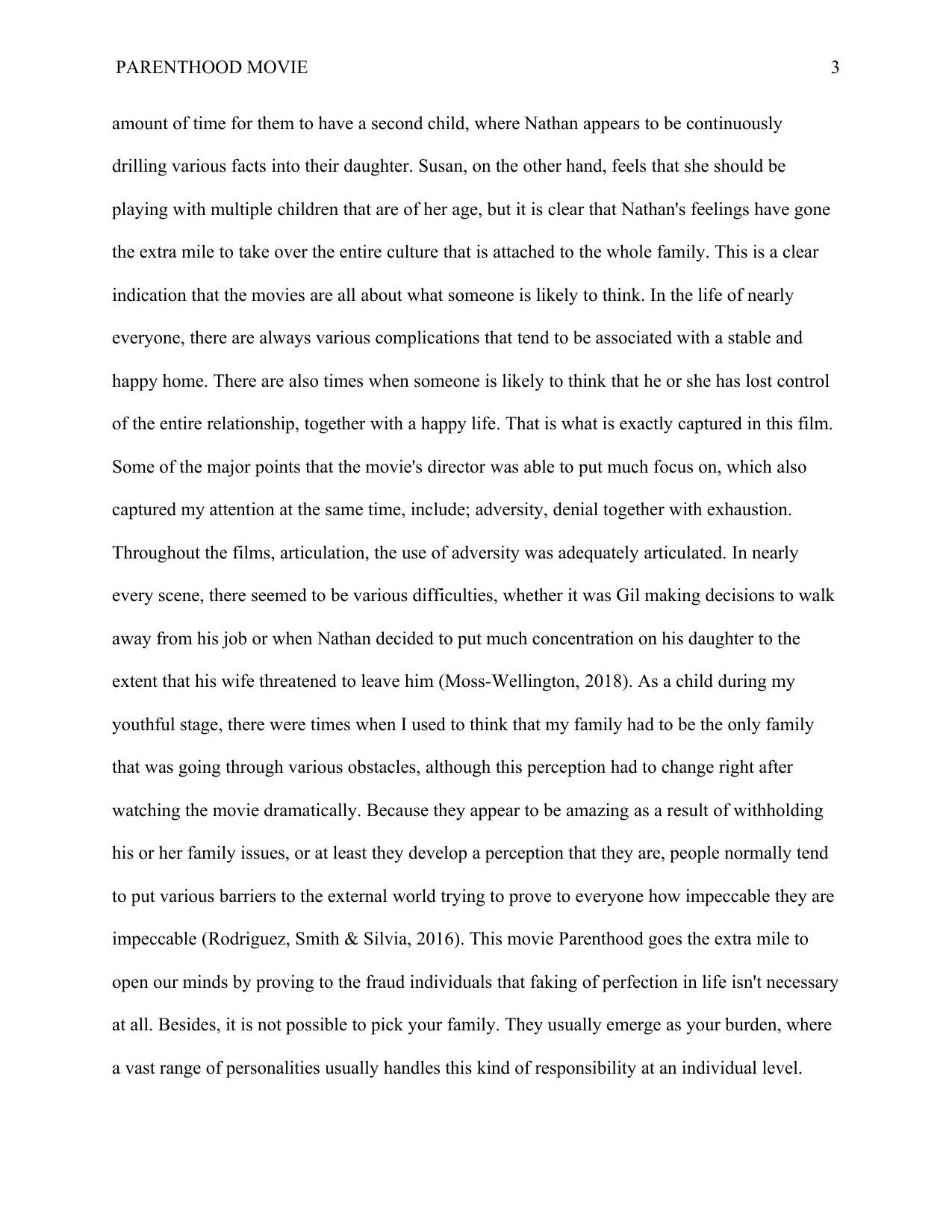
PARENTHOOD MOVIE 3
amount of time for them to have a second child, where Nathan appears to be continuously
drilling various facts into their daughter. Susan, on the other hand, feels that she should be
playing with multiple children that are of her age, but it is clear that Nathan's feelings have gone
the extra mile to take over the entire culture that is attached to the whole family. This is a clear
indication that the movies are all about what someone is likely to think. In the life of nearly
everyone, there are always various complications that tend to be associated with a stable and
happy home. There are also times when someone is likely to think that he or she has lost control
of the entire relationship, together with a happy life. That is what is exactly captured in this film.
Some of the major points that the movie's director was able to put much focus on, which also
captured my attention at the same time, include; adversity, denial together with exhaustion.
Throughout the films, articulation, the use of adversity was adequately articulated. In nearly
every scene, there seemed to be various difficulties, whether it was Gil making decisions to walk
away from his job or when Nathan decided to put much concentration on his daughter to the
extent that his wife threatened to leave him (Moss-Wellington, 2018). As a child during my
youthful stage, there were times when I used to think that my family had to be the only family
that was going through various obstacles, although this perception had to change right after
watching the movie dramatically. Because they appear to be amazing as a result of withholding
his or her family issues, or at least they develop a perception that they are, people normally tend
to put various barriers to the external world trying to prove to everyone how impeccable they are
impeccable (Rodriguez, Smith & Silvia, 2016). This movie Parenthood goes the extra mile to
open our minds by proving to the fraud individuals that faking of perfection in life isn't necessary
at all. Besides, it is not possible to pick your family. They usually emerge as your burden, where
a vast range of personalities usually handles this kind of responsibility at an individual level.
amount of time for them to have a second child, where Nathan appears to be continuously
drilling various facts into their daughter. Susan, on the other hand, feels that she should be
playing with multiple children that are of her age, but it is clear that Nathan's feelings have gone
the extra mile to take over the entire culture that is attached to the whole family. This is a clear
indication that the movies are all about what someone is likely to think. In the life of nearly
everyone, there are always various complications that tend to be associated with a stable and
happy home. There are also times when someone is likely to think that he or she has lost control
of the entire relationship, together with a happy life. That is what is exactly captured in this film.
Some of the major points that the movie's director was able to put much focus on, which also
captured my attention at the same time, include; adversity, denial together with exhaustion.
Throughout the films, articulation, the use of adversity was adequately articulated. In nearly
every scene, there seemed to be various difficulties, whether it was Gil making decisions to walk
away from his job or when Nathan decided to put much concentration on his daughter to the
extent that his wife threatened to leave him (Moss-Wellington, 2018). As a child during my
youthful stage, there were times when I used to think that my family had to be the only family
that was going through various obstacles, although this perception had to change right after
watching the movie dramatically. Because they appear to be amazing as a result of withholding
his or her family issues, or at least they develop a perception that they are, people normally tend
to put various barriers to the external world trying to prove to everyone how impeccable they are
impeccable (Rodriguez, Smith & Silvia, 2016). This movie Parenthood goes the extra mile to
open our minds by proving to the fraud individuals that faking of perfection in life isn't necessary
at all. Besides, it is not possible to pick your family. They usually emerge as your burden, where
a vast range of personalities usually handles this kind of responsibility at an individual level.
⊘ This is a preview!⊘
Do you want full access?
Subscribe today to unlock all pages.

Trusted by 1+ million students worldwide
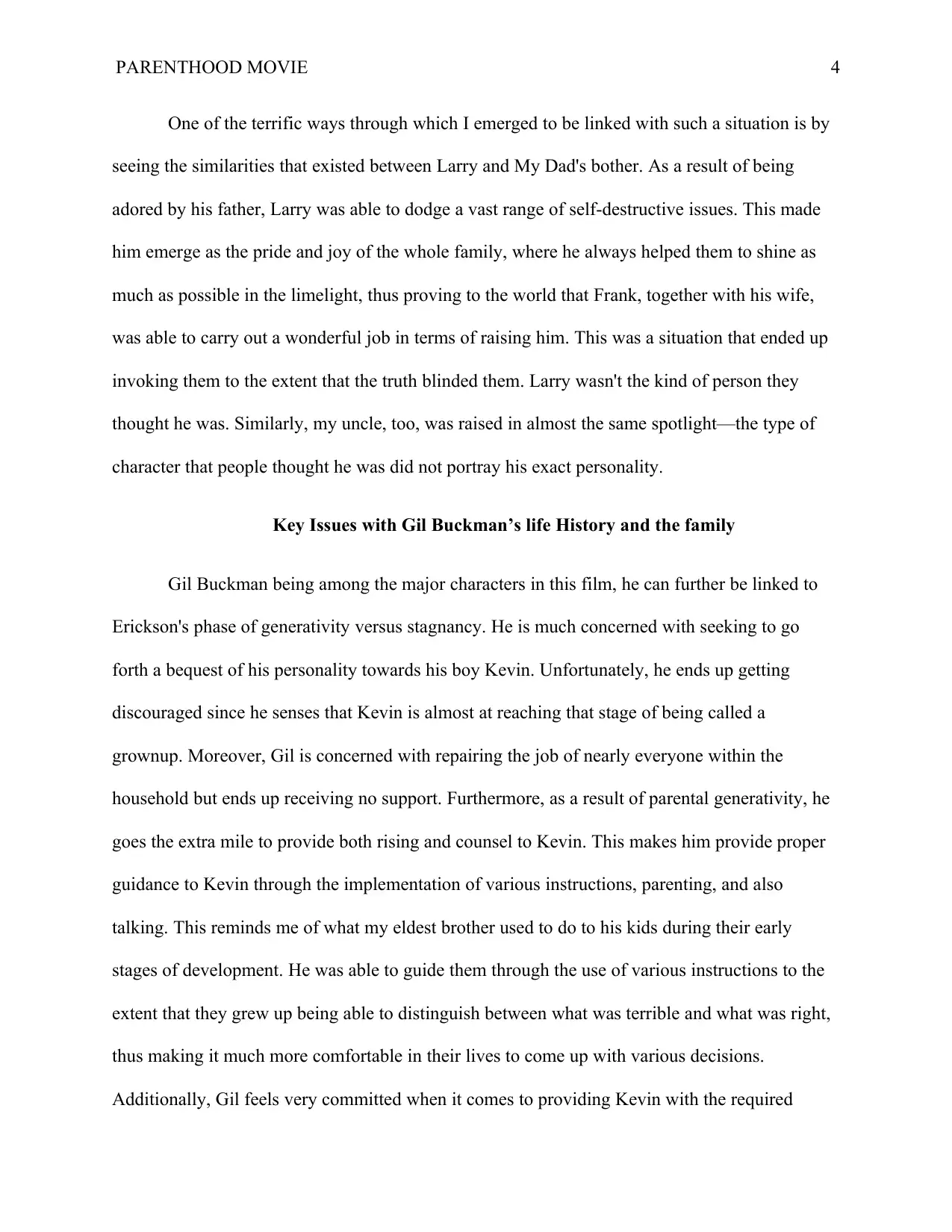
PARENTHOOD MOVIE 4
One of the terrific ways through which I emerged to be linked with such a situation is by
seeing the similarities that existed between Larry and My Dad's bother. As a result of being
adored by his father, Larry was able to dodge a vast range of self-destructive issues. This made
him emerge as the pride and joy of the whole family, where he always helped them to shine as
much as possible in the limelight, thus proving to the world that Frank, together with his wife,
was able to carry out a wonderful job in terms of raising him. This was a situation that ended up
invoking them to the extent that the truth blinded them. Larry wasn't the kind of person they
thought he was. Similarly, my uncle, too, was raised in almost the same spotlight—the type of
character that people thought he was did not portray his exact personality.
Key Issues with Gil Buckman’s life History and the family
Gil Buckman being among the major characters in this film, he can further be linked to
Erickson's phase of generativity versus stagnancy. He is much concerned with seeking to go
forth a bequest of his personality towards his boy Kevin. Unfortunately, he ends up getting
discouraged since he senses that Kevin is almost at reaching that stage of being called a
grownup. Moreover, Gil is concerned with repairing the job of nearly everyone within the
household but ends up receiving no support. Furthermore, as a result of parental generativity, he
goes the extra mile to provide both rising and counsel to Kevin. This makes him provide proper
guidance to Kevin through the implementation of various instructions, parenting, and also
talking. This reminds me of what my eldest brother used to do to his kids during their early
stages of development. He was able to guide them through the use of various instructions to the
extent that they grew up being able to distinguish between what was terrible and what was right,
thus making it much more comfortable in their lives to come up with various decisions.
Additionally, Gil feels very committed when it comes to providing Kevin with the required
One of the terrific ways through which I emerged to be linked with such a situation is by
seeing the similarities that existed between Larry and My Dad's bother. As a result of being
adored by his father, Larry was able to dodge a vast range of self-destructive issues. This made
him emerge as the pride and joy of the whole family, where he always helped them to shine as
much as possible in the limelight, thus proving to the world that Frank, together with his wife,
was able to carry out a wonderful job in terms of raising him. This was a situation that ended up
invoking them to the extent that the truth blinded them. Larry wasn't the kind of person they
thought he was. Similarly, my uncle, too, was raised in almost the same spotlight—the type of
character that people thought he was did not portray his exact personality.
Key Issues with Gil Buckman’s life History and the family
Gil Buckman being among the major characters in this film, he can further be linked to
Erickson's phase of generativity versus stagnancy. He is much concerned with seeking to go
forth a bequest of his personality towards his boy Kevin. Unfortunately, he ends up getting
discouraged since he senses that Kevin is almost at reaching that stage of being called a
grownup. Moreover, Gil is concerned with repairing the job of nearly everyone within the
household but ends up receiving no support. Furthermore, as a result of parental generativity, he
goes the extra mile to provide both rising and counsel to Kevin. This makes him provide proper
guidance to Kevin through the implementation of various instructions, parenting, and also
talking. This reminds me of what my eldest brother used to do to his kids during their early
stages of development. He was able to guide them through the use of various instructions to the
extent that they grew up being able to distinguish between what was terrible and what was right,
thus making it much more comfortable in their lives to come up with various decisions.
Additionally, Gil feels very committed when it comes to providing Kevin with the required
Paraphrase This Document
Need a fresh take? Get an instant paraphrase of this document with our AI Paraphraser
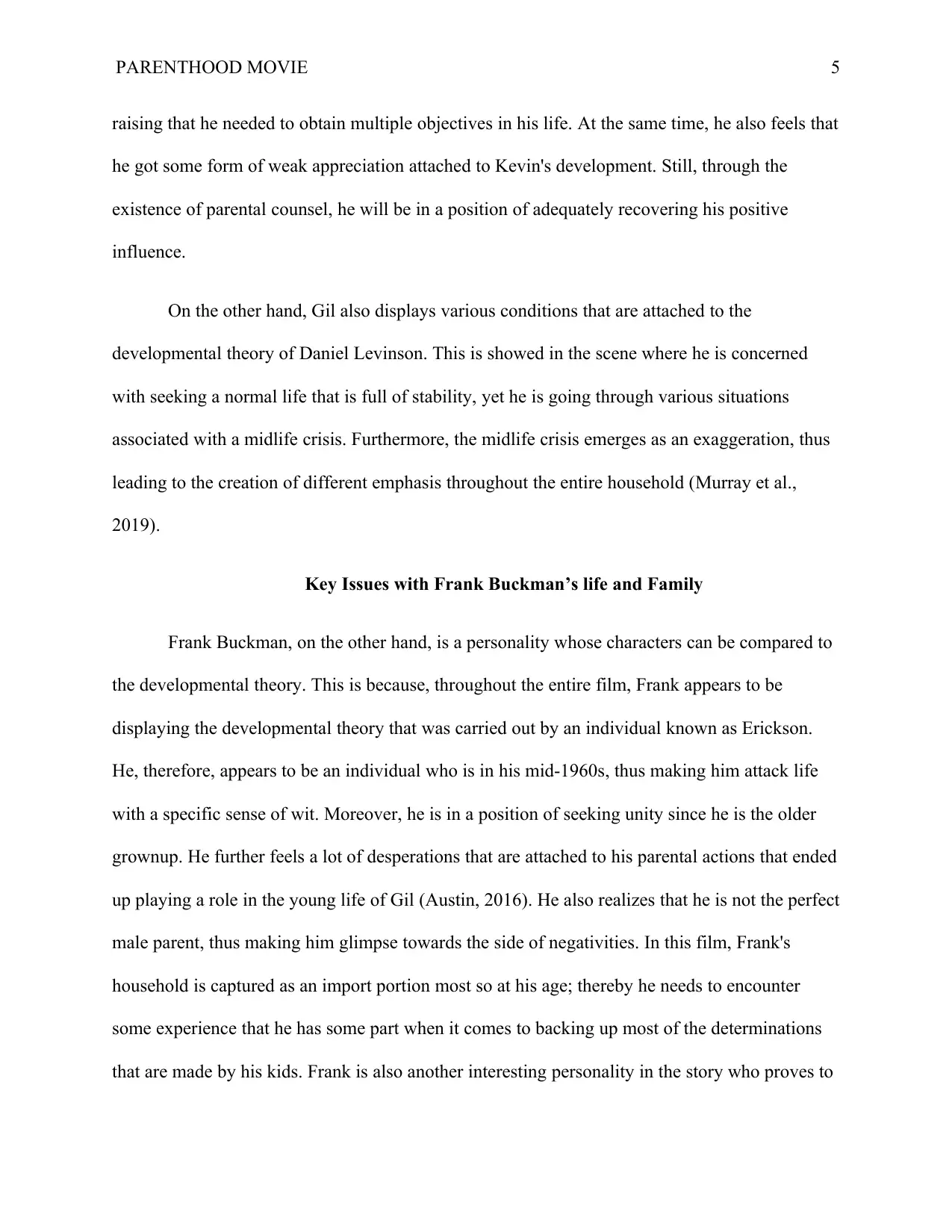
PARENTHOOD MOVIE 5
raising that he needed to obtain multiple objectives in his life. At the same time, he also feels that
he got some form of weak appreciation attached to Kevin's development. Still, through the
existence of parental counsel, he will be in a position of adequately recovering his positive
influence.
On the other hand, Gil also displays various conditions that are attached to the
developmental theory of Daniel Levinson. This is showed in the scene where he is concerned
with seeking a normal life that is full of stability, yet he is going through various situations
associated with a midlife crisis. Furthermore, the midlife crisis emerges as an exaggeration, thus
leading to the creation of different emphasis throughout the entire household (Murray et al.,
2019).
Key Issues with Frank Buckman’s life and Family
Frank Buckman, on the other hand, is a personality whose characters can be compared to
the developmental theory. This is because, throughout the entire film, Frank appears to be
displaying the developmental theory that was carried out by an individual known as Erickson.
He, therefore, appears to be an individual who is in his mid-1960s, thus making him attack life
with a specific sense of wit. Moreover, he is in a position of seeking unity since he is the older
grownup. He further feels a lot of desperations that are attached to his parental actions that ended
up playing a role in the young life of Gil (Austin, 2016). He also realizes that he is not the perfect
male parent, thus making him glimpse towards the side of negativities. In this film, Frank's
household is captured as an import portion most so at his age; thereby he needs to encounter
some experience that he has some part when it comes to backing up most of the determinations
that are made by his kids. Frank is also another interesting personality in the story who proves to
raising that he needed to obtain multiple objectives in his life. At the same time, he also feels that
he got some form of weak appreciation attached to Kevin's development. Still, through the
existence of parental counsel, he will be in a position of adequately recovering his positive
influence.
On the other hand, Gil also displays various conditions that are attached to the
developmental theory of Daniel Levinson. This is showed in the scene where he is concerned
with seeking a normal life that is full of stability, yet he is going through various situations
associated with a midlife crisis. Furthermore, the midlife crisis emerges as an exaggeration, thus
leading to the creation of different emphasis throughout the entire household (Murray et al.,
2019).
Key Issues with Frank Buckman’s life and Family
Frank Buckman, on the other hand, is a personality whose characters can be compared to
the developmental theory. This is because, throughout the entire film, Frank appears to be
displaying the developmental theory that was carried out by an individual known as Erickson.
He, therefore, appears to be an individual who is in his mid-1960s, thus making him attack life
with a specific sense of wit. Moreover, he is in a position of seeking unity since he is the older
grownup. He further feels a lot of desperations that are attached to his parental actions that ended
up playing a role in the young life of Gil (Austin, 2016). He also realizes that he is not the perfect
male parent, thus making him glimpse towards the side of negativities. In this film, Frank's
household is captured as an import portion most so at his age; thereby he needs to encounter
some experience that he has some part when it comes to backing up most of the determinations
that are made by his kids. Frank is also another interesting personality in the story who proves to
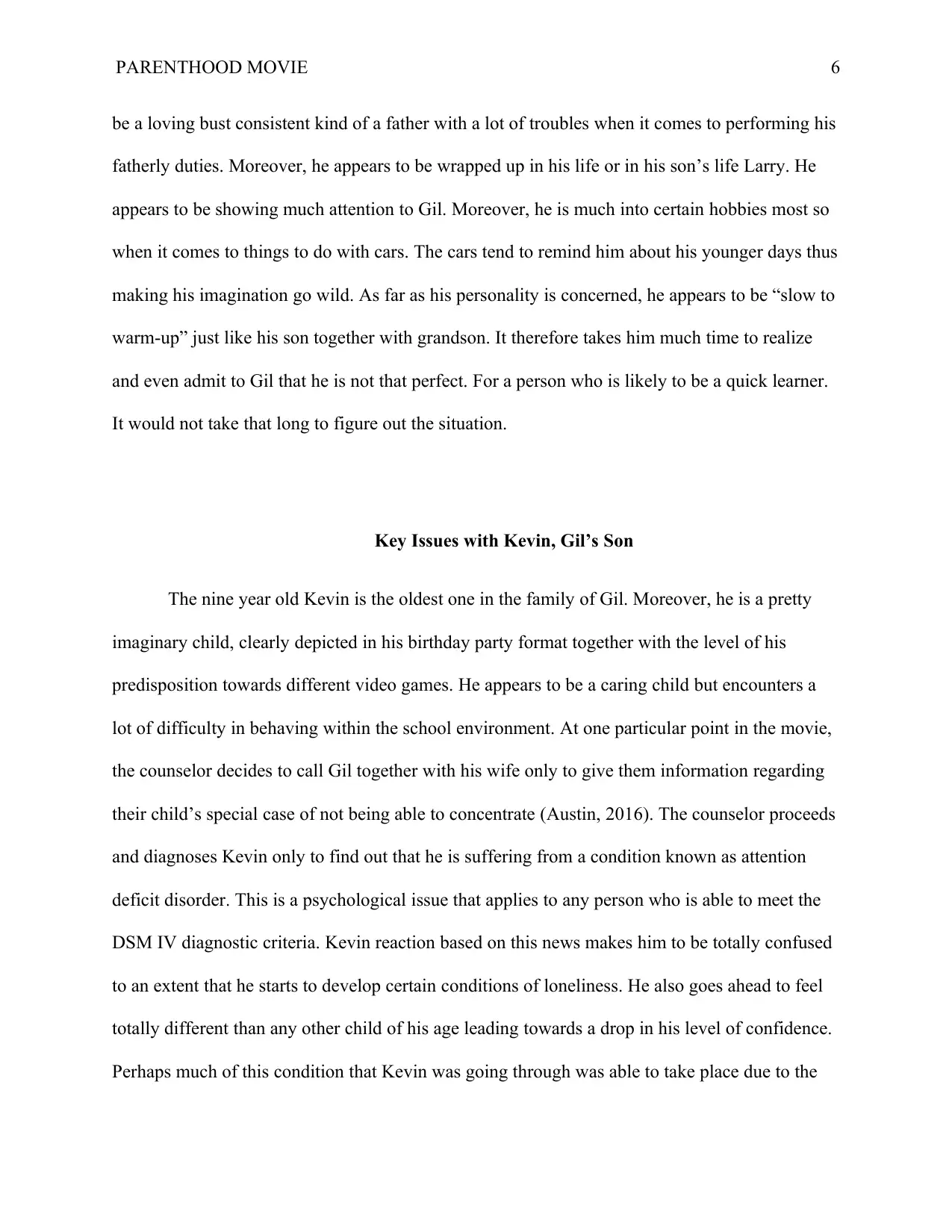
PARENTHOOD MOVIE 6
be a loving bust consistent kind of a father with a lot of troubles when it comes to performing his
fatherly duties. Moreover, he appears to be wrapped up in his life or in his son’s life Larry. He
appears to be showing much attention to Gil. Moreover, he is much into certain hobbies most so
when it comes to things to do with cars. The cars tend to remind him about his younger days thus
making his imagination go wild. As far as his personality is concerned, he appears to be “slow to
warm-up” just like his son together with grandson. It therefore takes him much time to realize
and even admit to Gil that he is not that perfect. For a person who is likely to be a quick learner.
It would not take that long to figure out the situation.
Key Issues with Kevin, Gil’s Son
The nine year old Kevin is the oldest one in the family of Gil. Moreover, he is a pretty
imaginary child, clearly depicted in his birthday party format together with the level of his
predisposition towards different video games. He appears to be a caring child but encounters a
lot of difficulty in behaving within the school environment. At one particular point in the movie,
the counselor decides to call Gil together with his wife only to give them information regarding
their child’s special case of not being able to concentrate (Austin, 2016). The counselor proceeds
and diagnoses Kevin only to find out that he is suffering from a condition known as attention
deficit disorder. This is a psychological issue that applies to any person who is able to meet the
DSM IV diagnostic criteria. Kevin reaction based on this news makes him to be totally confused
to an extent that he starts to develop certain conditions of loneliness. He also goes ahead to feel
totally different than any other child of his age leading towards a drop in his level of confidence.
Perhaps much of this condition that Kevin was going through was able to take place due to the
be a loving bust consistent kind of a father with a lot of troubles when it comes to performing his
fatherly duties. Moreover, he appears to be wrapped up in his life or in his son’s life Larry. He
appears to be showing much attention to Gil. Moreover, he is much into certain hobbies most so
when it comes to things to do with cars. The cars tend to remind him about his younger days thus
making his imagination go wild. As far as his personality is concerned, he appears to be “slow to
warm-up” just like his son together with grandson. It therefore takes him much time to realize
and even admit to Gil that he is not that perfect. For a person who is likely to be a quick learner.
It would not take that long to figure out the situation.
Key Issues with Kevin, Gil’s Son
The nine year old Kevin is the oldest one in the family of Gil. Moreover, he is a pretty
imaginary child, clearly depicted in his birthday party format together with the level of his
predisposition towards different video games. He appears to be a caring child but encounters a
lot of difficulty in behaving within the school environment. At one particular point in the movie,
the counselor decides to call Gil together with his wife only to give them information regarding
their child’s special case of not being able to concentrate (Austin, 2016). The counselor proceeds
and diagnoses Kevin only to find out that he is suffering from a condition known as attention
deficit disorder. This is a psychological issue that applies to any person who is able to meet the
DSM IV diagnostic criteria. Kevin reaction based on this news makes him to be totally confused
to an extent that he starts to develop certain conditions of loneliness. He also goes ahead to feel
totally different than any other child of his age leading towards a drop in his level of confidence.
Perhaps much of this condition that Kevin was going through was able to take place due to the
⊘ This is a preview!⊘
Do you want full access?
Subscribe today to unlock all pages.

Trusted by 1+ million students worldwide
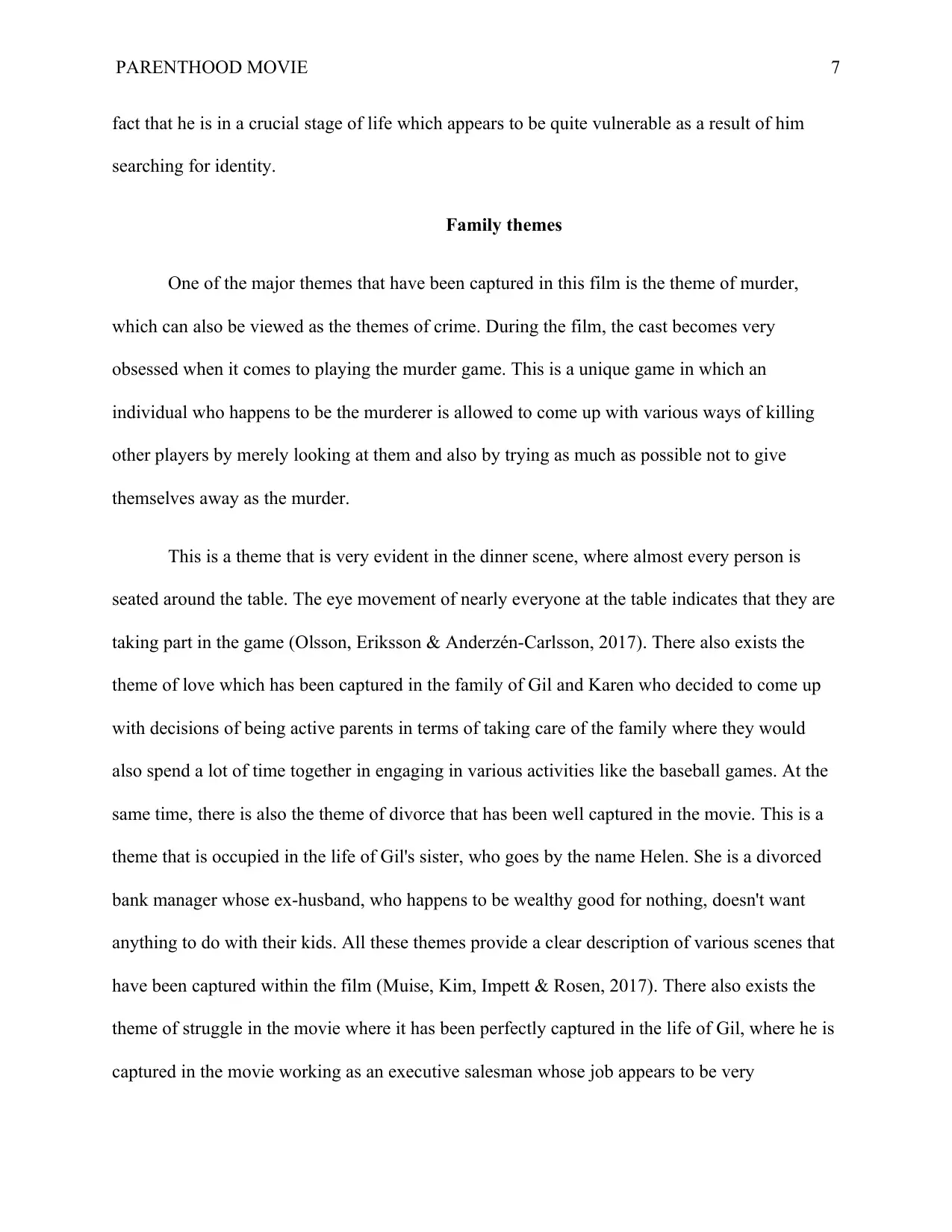
PARENTHOOD MOVIE 7
fact that he is in a crucial stage of life which appears to be quite vulnerable as a result of him
searching for identity.
Family themes
One of the major themes that have been captured in this film is the theme of murder,
which can also be viewed as the themes of crime. During the film, the cast becomes very
obsessed when it comes to playing the murder game. This is a unique game in which an
individual who happens to be the murderer is allowed to come up with various ways of killing
other players by merely looking at them and also by trying as much as possible not to give
themselves away as the murder.
This is a theme that is very evident in the dinner scene, where almost every person is
seated around the table. The eye movement of nearly everyone at the table indicates that they are
taking part in the game (Olsson, Eriksson & Anderzén-Carlsson, 2017). There also exists the
theme of love which has been captured in the family of Gil and Karen who decided to come up
with decisions of being active parents in terms of taking care of the family where they would
also spend a lot of time together in engaging in various activities like the baseball games. At the
same time, there is also the theme of divorce that has been well captured in the movie. This is a
theme that is occupied in the life of Gil's sister, who goes by the name Helen. She is a divorced
bank manager whose ex-husband, who happens to be wealthy good for nothing, doesn't want
anything to do with their kids. All these themes provide a clear description of various scenes that
have been captured within the film (Muise, Kim, Impett & Rosen, 2017). There also exists the
theme of struggle in the movie where it has been perfectly captured in the life of Gil, where he is
captured in the movie working as an executive salesman whose job appears to be very
fact that he is in a crucial stage of life which appears to be quite vulnerable as a result of him
searching for identity.
Family themes
One of the major themes that have been captured in this film is the theme of murder,
which can also be viewed as the themes of crime. During the film, the cast becomes very
obsessed when it comes to playing the murder game. This is a unique game in which an
individual who happens to be the murderer is allowed to come up with various ways of killing
other players by merely looking at them and also by trying as much as possible not to give
themselves away as the murder.
This is a theme that is very evident in the dinner scene, where almost every person is
seated around the table. The eye movement of nearly everyone at the table indicates that they are
taking part in the game (Olsson, Eriksson & Anderzén-Carlsson, 2017). There also exists the
theme of love which has been captured in the family of Gil and Karen who decided to come up
with decisions of being active parents in terms of taking care of the family where they would
also spend a lot of time together in engaging in various activities like the baseball games. At the
same time, there is also the theme of divorce that has been well captured in the movie. This is a
theme that is occupied in the life of Gil's sister, who goes by the name Helen. She is a divorced
bank manager whose ex-husband, who happens to be wealthy good for nothing, doesn't want
anything to do with their kids. All these themes provide a clear description of various scenes that
have been captured within the film (Muise, Kim, Impett & Rosen, 2017). There also exists the
theme of struggle in the movie where it has been perfectly captured in the life of Gil, where he is
captured in the movie working as an executive salesman whose job appears to be very
Paraphrase This Document
Need a fresh take? Get an instant paraphrase of this document with our AI Paraphraser
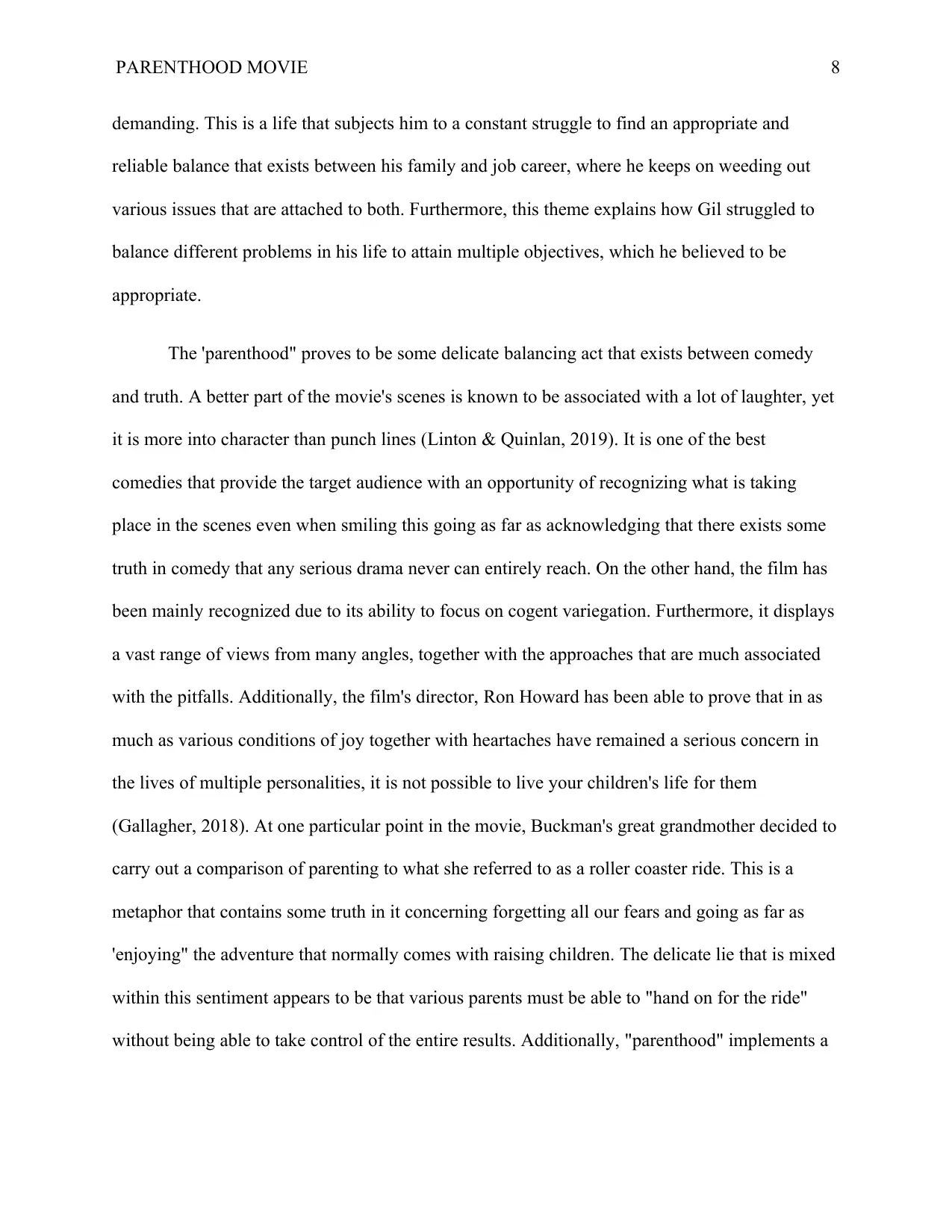
PARENTHOOD MOVIE 8
demanding. This is a life that subjects him to a constant struggle to find an appropriate and
reliable balance that exists between his family and job career, where he keeps on weeding out
various issues that are attached to both. Furthermore, this theme explains how Gil struggled to
balance different problems in his life to attain multiple objectives, which he believed to be
appropriate.
The 'parenthood" proves to be some delicate balancing act that exists between comedy
and truth. A better part of the movie's scenes is known to be associated with a lot of laughter, yet
it is more into character than punch lines (Linton & Quinlan, 2019). It is one of the best
comedies that provide the target audience with an opportunity of recognizing what is taking
place in the scenes even when smiling this going as far as acknowledging that there exists some
truth in comedy that any serious drama never can entirely reach. On the other hand, the film has
been mainly recognized due to its ability to focus on cogent variegation. Furthermore, it displays
a vast range of views from many angles, together with the approaches that are much associated
with the pitfalls. Additionally, the film's director, Ron Howard has been able to prove that in as
much as various conditions of joy together with heartaches have remained a serious concern in
the lives of multiple personalities, it is not possible to live your children's life for them
(Gallagher, 2018). At one particular point in the movie, Buckman's great grandmother decided to
carry out a comparison of parenting to what she referred to as a roller coaster ride. This is a
metaphor that contains some truth in it concerning forgetting all our fears and going as far as
'enjoying" the adventure that normally comes with raising children. The delicate lie that is mixed
within this sentiment appears to be that various parents must be able to "hand on for the ride"
without being able to take control of the entire results. Additionally, "parenthood" implements a
demanding. This is a life that subjects him to a constant struggle to find an appropriate and
reliable balance that exists between his family and job career, where he keeps on weeding out
various issues that are attached to both. Furthermore, this theme explains how Gil struggled to
balance different problems in his life to attain multiple objectives, which he believed to be
appropriate.
The 'parenthood" proves to be some delicate balancing act that exists between comedy
and truth. A better part of the movie's scenes is known to be associated with a lot of laughter, yet
it is more into character than punch lines (Linton & Quinlan, 2019). It is one of the best
comedies that provide the target audience with an opportunity of recognizing what is taking
place in the scenes even when smiling this going as far as acknowledging that there exists some
truth in comedy that any serious drama never can entirely reach. On the other hand, the film has
been mainly recognized due to its ability to focus on cogent variegation. Furthermore, it displays
a vast range of views from many angles, together with the approaches that are much associated
with the pitfalls. Additionally, the film's director, Ron Howard has been able to prove that in as
much as various conditions of joy together with heartaches have remained a serious concern in
the lives of multiple personalities, it is not possible to live your children's life for them
(Gallagher, 2018). At one particular point in the movie, Buckman's great grandmother decided to
carry out a comparison of parenting to what she referred to as a roller coaster ride. This is a
metaphor that contains some truth in it concerning forgetting all our fears and going as far as
'enjoying" the adventure that normally comes with raising children. The delicate lie that is mixed
within this sentiment appears to be that various parents must be able to "hand on for the ride"
without being able to take control of the entire results. Additionally, "parenthood" implements a

PARENTHOOD MOVIE 9
lot of efforts that further provide it with an opportunity of winning points in its known realistic
portrayal that is attached to specific personality types together with family dynamics.
lot of efforts that further provide it with an opportunity of winning points in its known realistic
portrayal that is attached to specific personality types together with family dynamics.
⊘ This is a preview!⊘
Do you want full access?
Subscribe today to unlock all pages.

Trusted by 1+ million students worldwide
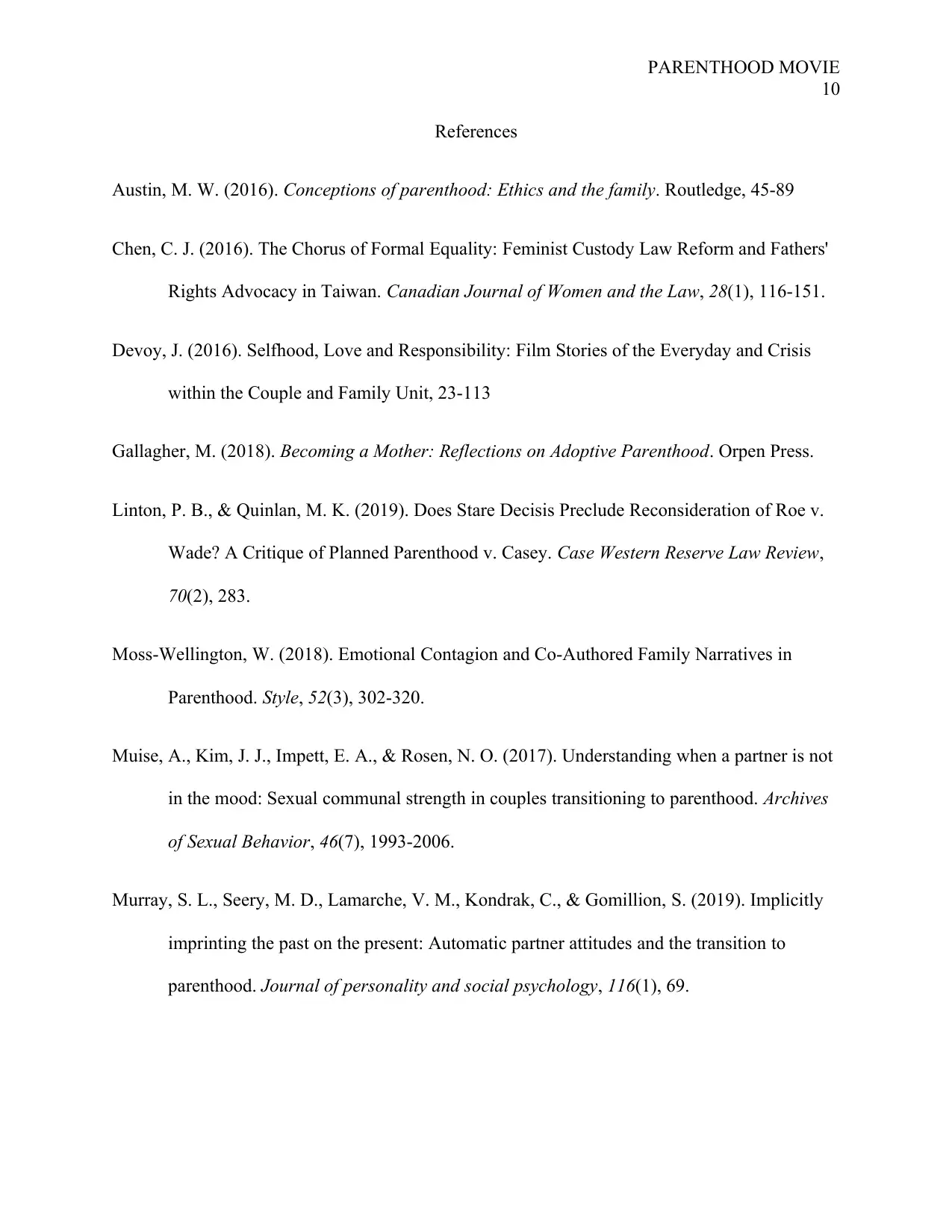
PARENTHOOD MOVIE
10
References
Austin, M. W. (2016). Conceptions of parenthood: Ethics and the family. Routledge, 45-89
Chen, C. J. (2016). The Chorus of Formal Equality: Feminist Custody Law Reform and Fathers'
Rights Advocacy in Taiwan. Canadian Journal of Women and the Law, 28(1), 116-151.
Devoy, J. (2016). Selfhood, Love and Responsibility: Film Stories of the Everyday and Crisis
within the Couple and Family Unit, 23-113
Gallagher, M. (2018). Becoming a Mother: Reflections on Adoptive Parenthood. Orpen Press.
Linton, P. B., & Quinlan, M. K. (2019). Does Stare Decisis Preclude Reconsideration of Roe v.
Wade? A Critique of Planned Parenthood v. Casey. Case Western Reserve Law Review,
70(2), 283.
Moss-Wellington, W. (2018). Emotional Contagion and Co-Authored Family Narratives in
Parenthood. Style, 52(3), 302-320.
Muise, A., Kim, J. J., Impett, E. A., & Rosen, N. O. (2017). Understanding when a partner is not
in the mood: Sexual communal strength in couples transitioning to parenthood. Archives
of Sexual Behavior, 46(7), 1993-2006.
Murray, S. L., Seery, M. D., Lamarche, V. M., Kondrak, C., & Gomillion, S. (2019). Implicitly
imprinting the past on the present: Automatic partner attitudes and the transition to
parenthood. Journal of personality and social psychology, 116(1), 69.
10
References
Austin, M. W. (2016). Conceptions of parenthood: Ethics and the family. Routledge, 45-89
Chen, C. J. (2016). The Chorus of Formal Equality: Feminist Custody Law Reform and Fathers'
Rights Advocacy in Taiwan. Canadian Journal of Women and the Law, 28(1), 116-151.
Devoy, J. (2016). Selfhood, Love and Responsibility: Film Stories of the Everyday and Crisis
within the Couple and Family Unit, 23-113
Gallagher, M. (2018). Becoming a Mother: Reflections on Adoptive Parenthood. Orpen Press.
Linton, P. B., & Quinlan, M. K. (2019). Does Stare Decisis Preclude Reconsideration of Roe v.
Wade? A Critique of Planned Parenthood v. Casey. Case Western Reserve Law Review,
70(2), 283.
Moss-Wellington, W. (2018). Emotional Contagion and Co-Authored Family Narratives in
Parenthood. Style, 52(3), 302-320.
Muise, A., Kim, J. J., Impett, E. A., & Rosen, N. O. (2017). Understanding when a partner is not
in the mood: Sexual communal strength in couples transitioning to parenthood. Archives
of Sexual Behavior, 46(7), 1993-2006.
Murray, S. L., Seery, M. D., Lamarche, V. M., Kondrak, C., & Gomillion, S. (2019). Implicitly
imprinting the past on the present: Automatic partner attitudes and the transition to
parenthood. Journal of personality and social psychology, 116(1), 69.
Paraphrase This Document
Need a fresh take? Get an instant paraphrase of this document with our AI Paraphraser
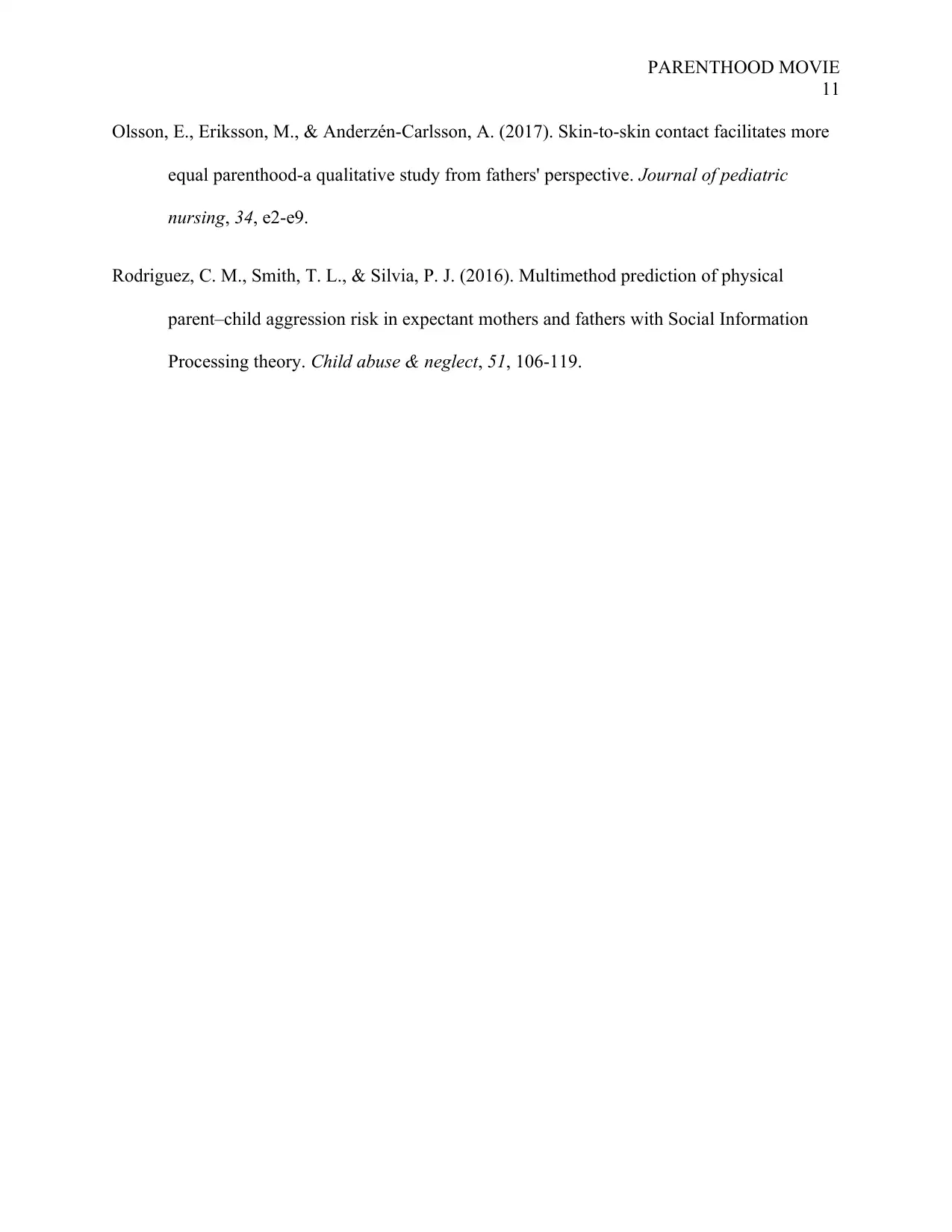
PARENTHOOD MOVIE
11
Olsson, E., Eriksson, M., & Anderzén-Carlsson, A. (2017). Skin-to-skin contact facilitates more
equal parenthood-a qualitative study from fathers' perspective. Journal of pediatric
nursing, 34, e2-e9.
Rodriguez, C. M., Smith, T. L., & Silvia, P. J. (2016). Multimethod prediction of physical
parent–child aggression risk in expectant mothers and fathers with Social Information
Processing theory. Child abuse & neglect, 51, 106-119.
11
Olsson, E., Eriksson, M., & Anderzén-Carlsson, A. (2017). Skin-to-skin contact facilitates more
equal parenthood-a qualitative study from fathers' perspective. Journal of pediatric
nursing, 34, e2-e9.
Rodriguez, C. M., Smith, T. L., & Silvia, P. J. (2016). Multimethod prediction of physical
parent–child aggression risk in expectant mothers and fathers with Social Information
Processing theory. Child abuse & neglect, 51, 106-119.
1 out of 11
Your All-in-One AI-Powered Toolkit for Academic Success.
+13062052269
info@desklib.com
Available 24*7 on WhatsApp / Email
![[object Object]](/_next/static/media/star-bottom.7253800d.svg)
Unlock your academic potential
Copyright © 2020–2026 A2Z Services. All Rights Reserved. Developed and managed by ZUCOL.